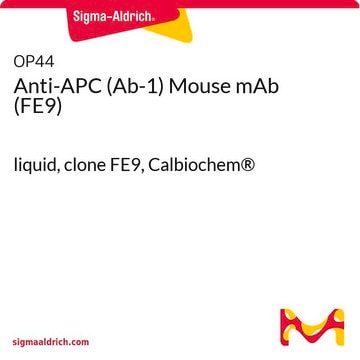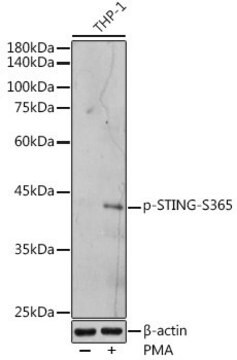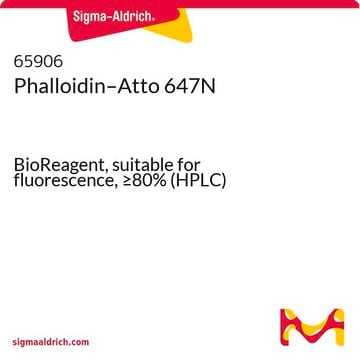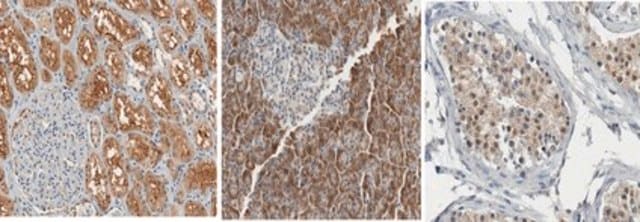OP45
Anti-DCC Mouse mAb (AF5)
Sinônimo(s):
Anti-Deleted Colorectal Carcinoma
Faça loginpara ver os preços organizacionais e de contrato
About This Item
Produtos recomendados
forma do anticorpo
purified antibody
Nível de qualidade
clone
AF5, monoclonal
forma
liquid
contém
≤0.1% sodium azide as preservative
reatividade de espécies
human
Isotipo
IgG1
Descrição geral
Invasive, metastatic colon cancer arises from pre-existing adenomas in both familial and sporadic cases and is characterized by the presence of multiple chromosomal alterations. In the progression from intramucosal carcinoma to invasive carcinoma, allelic loss on the long arm of chromosome 18 is frequently observed. Recently, a gene on 18q21.3 termed DCC, for deleted in colorectal carcinoma, has been isolated and shown to be deleted or mutated in both sporadic and inherited colon carcinoma whereas normal colonic tissue retained and expressed the gene. Furthermore, loss of DCC expression appears to accompany progression of adenomas to metastatic carcinoma. The inactivation of DCC suggests that it is a tumor suppressor gene. A functional role for DCC as a tumor suppressor gene is indicated by experiments demonstrating that introduction of a normal chromosome 18 into the human colon tumor cell lines COKFu or SW480.7 lacking DCC suppresses tumorigenicity. Analysis of the amino acid sequence deduced from cDNA clones indicates that DCC is a transmembrane glycoprotein consisting of 1447 amino acids with an extracellular domain having extensive similarity to neural cell adhesion molecules (NCAM), a single transmembrane segment, and a unique cytoplasmic domain. The high degree of similarity to NCAMs suggests that DCC is involved in cell-cell interactions essential to the differentiated state of the colonic epithelium. DCC expression has been observed in all tissues examined except liver with the highest level of expression in brain tissue. Alterations in DCC expression have also been observed in pancreatic adenocarcinoma and esophogeal carcinoma. However, DCC mRNA is expressed at very low levels, requiring reverse transcription followed by PCR amplification for unambiguous detection.
Purified mouse monoclonal antibody. Recognizes the ~190 kDa DCC protein.
Recognizes the ~190 kDa DCC protein in IMR32 cells.
Imunogênio
the extracellular domain of human DCC
Aplicação
Immunoblotting (1-5 μg/ml)
Immunofluorescence (1-5 μg/ml)
Immunoprecipitation (1-2 μg/sample)
Immunofluorescence (1-5 μg/ml)
Immunoprecipitation (1-2 μg/sample)
forma física
In 0.05 M sodium phosphate buffer, 0.2% gelatin.
Nota de análise
Negative Control
SW480 cells
SW480 cells
Positive Control
IMR32 cells
IMR32 cells
Outras notas
IMMUNOBLOTTING PROCEDURE
Anti-DCC (Ab-1) can be used to immunoblot proteins previously separated by sodium dodecyl sulfate-polyacrylamide gel electrophoresis and electrophoretically transferred onto nitrocellulose membranes. The proteins a
Certificados de análise (COA)
Busque Certificados de análise (COA) digitando o Número do Lote do produto. Os números de lote e remessa podem ser encontrados no rótulo de um produto após a palavra “Lot” ou “Batch”.
Já possui este produto?
Encontre a documentação dos produtos que você adquiriu recentemente na biblioteca de documentos.
A genetic model for colorectal tumorigenesis.
E R Fearon et al.
Cell, 61(5), 759-767 (1990-06-01)
Y Huang et al.
Cancer research, 52(23), 6525-6530 (1992-12-01)
Loss of heterozygosity occurring on various chromosomes has been described in the majority of human tumors. The targets of frequent or consistent subchromosomal deletions are believed to be tumor suppressor genes. We examined 72 esophageal tumors (46 squamous cell carcinomas
M W Höhne et al.
Cancer research, 52(9), 2616-2619 (1992-05-01)
The development of colon carcinomas is associated with allelic deletions on chromosomes 5q, 17p, and 18q. The DCC gene located on chromosome 18q21.3 codes for a potential tumor suppressor gene related to cellular adhesion receptors. We investigated the expression of
K Tanaka et al.
Nature, 349(6307), 340-342 (1991-01-24)
Development of colon carcinomas can be associated with allelic deletions on several chromosomes, including 5q and 18q. The APC gene on 5q and the DCC gene on 18q have been identified as potential tumour suppressor genes, whose suppression contributes to
M G Dunlop
Seminars in cancer biology, 3(3), 131-140 (1992-06-01)
Due to the accessibility of the intermediate steps in the progression of colorectal cancer and to the existence of heritable susceptibility to the disease, molecular genetic analysis of colorectal carcinogenesis seems likely to answer many of the questions concerning the
Nossa equipe de cientistas tem experiência em todas as áreas de pesquisa, incluindo Life Sciences, ciência de materiais, síntese química, cromatografia, química analítica e muitas outras.
Entre em contato com a assistência técnica








